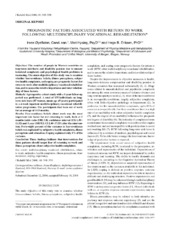Prognostic factors associated with return to work following multidisciplinary vocational rehabilitation
Peer reviewed, Journal article
Published version

Åpne
Permanent lenke
https://hdl.handle.net/1956/12830Utgivelsesdato
2008Metadata
Vis full innførselSamlinger
Originalversjon
https://doi.org/10.2340/16501977-0202Sammendrag
OBJECTIVES: The number of people in Western countries on long-term sick-leave and disability pension due to musculoskeletal complaints and psychological health problems is increasing. The main objective of this study was to examine whether fear-avoidance beliefs, illness perceptions, subjective health complaints, and coping are prognostic factors for return to work after multidisciplinary vocational rehabilitation, and to assess the relative importance and inter-relationship of these factors. METHODS: A prospective cohort study with a 1-year follow-up period was performed. A total of 135 individuals on long-term sick-leave (87 women, mean age 45 years) participated in a 4-week inpatient multidisciplinary vocational rehabilitation programme. The participants had been out of work for an average of 10.5 months. RESULTS: Fear-avoidance beliefs about work was the most important risk factor for not returning to work, both at 3 months (odds ratio (OR) 3.8; confidence interval (CI) 1.30–11.32) and 1 year (OR 9.5; CI 2.40–37.53) after the intervention. Forty-eight percent of the variance in fear-avoidance beliefs was explained by subjective health complaints, illness perceptions and education. Coping explained only 1% of the variance. CONCLUSION: These findings indicate that interventions for these patients should target fear of returning to work and illness perceptions about subjective health complaints.